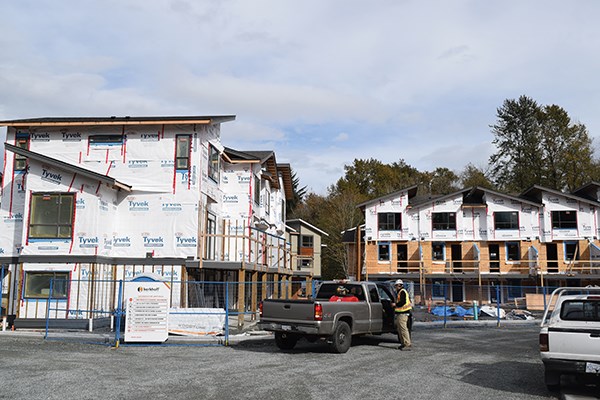A petition that is currently circulating takes aim at local governments and those who oppose density.
The Independent Contractors and Businesses Association of British Columbia (ICBA) recently launched the Responsible Housing Development campaign urging municipalities such as Squamish to increase supply by reducing fees and ignoring NIMBYism – those who espouse “not in my back yard” whenever dense developments are proposed.
The goal of the campaign is “to try to educate and build a bit of an army of people who better understand the issue and go to local governments and say ‘You have a huge responsibility in increasing the supply,’” said Philip Hochstein, president of the ICBA.
If there is more housing stock, house prices will level out, Hochstein argues.
Local governments often face a crowded, angry chamber when they try to increase density and thus housing supply, he said, but mayors and councils must stay strong in the face of NIMBYism.
“The people that don’t want anything built anytime, ever, seem to dominate the discussions, but I believe they are a small minority,” he said.
“They also claim they want good climate and better transit and all those other things that require density and… getting more out of the space we have.”
To deal with the affordability crunch municipalities also have to approve more dense projects faster and reduce fees, he said.
In the average townhouse development, direct fees and charges add over $17,000 to the cost of the unit, based on Metro Vancouver calculations, according to the association.
The extra municipal fees added to the cost of each home eliminate a number of people who can no longer afford to get into the market, according to Hochstein.
“Local governments are a big factor in the affordability issue we have now, both in terms of their zoning and the way they go about it and the charges that they impose on every new housing unit,” he said.
The fees that municipalities collect for such things as rezoning, development cost charges, building permits, development permits and regional district charges and community amenity charges hurt supply, he said.
“That is just another way to tax new home buyers,” he said.
“Because the developer doesn’t assume those charges, he passes those charges on.”
Mayor Patricia Heintzman said it isn’t the municipal charges that are causing the supply and affordability problem in the current Squamish housing crunch.
Payments such as development cost charges and community amenity contributions come out of new growth, she said.
“That is not burdening today’s taxpayer for tomorrow’s future,” she said.
“Supply and demand is what is driving costs up, it always is,” she said.
Heintzman said she thinks local developers got caught “flat footed” a few years ago and didn’t anticipate the rapid increase in demand for housing in Squamish.
“And they are just catching up now,” she said.
“The supply side is going to increase rapidly.”
With hundreds of units set to come on the market soon and thousands more to follow in Squamish, that will help with demand and, hopefully, affordability in the district, she added.
With more supply, housing prices will adjust, she said.
Heintzman acknowledged councils do feel pressure from those who don’t want density beside them, but she baulks at calling it NIMBYism.
“There’s something correct about what they are saying. They technically will be impacted,” she said, adding that councils also do sometimes get it wrong and try to put in a development that doesn’t suit the community.
The current council tries its best to follow the Official Community Plan, which set out increasing density – the number of taxpayers – to pay for infrastructure needed in the district, she said.
“We are trying to focus it on the downtown and the main transportation corridors,” she noted.
Once completed, the Independent Contractors and Businesses Association petition will be sent around to municipal councils “to become the noise that they hear from the other side,” Hochstein said.
To check out or sign the petition go to icba.ca/growing-the-economy/#housing.



